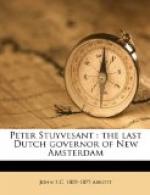“The whole summer was spent in the prosecutions. A coincidence of slight circumstances was magnified, by the general terror, into violent presumptions. Tales collected without doors, mingling with the proofs given at the bar, poisoned the minds of the jurors, and this sanguinary spirit of the day suffered no check until Mary, the capital informer, bewildered by the frequent examinations and suggestions, began to touch characters which malice itself dare not suspect.”
During this period of almost insane excitement, thirteen negroes were burned at the stake, eighteen were hanged, and seventy transported.
I cannot conclude this treatise upon the olden time better than by quoting the eloquent words of Mr. Kip:
“The dress, which had for generations been the sign and symbol of a gentleman, gradually waned away, till society reached that charming state of equality in which it became impossible, by any outward costume, to distinguish masters from servants. John Jay says, in one of his letters, that with small clothes and buckles the high tone of society departed. In the writer’s early day this system of the past was just going out. Wigs and powder and queues, breeches and buckles, still lingered among the older gentlemen, vestiges of an age which was vanishing away.
“But the high toned feeling of the last century was still in the ascendant, and had not yet succumbed to the worship of mammon, which characterizes this age. There was still in New York a reverence for the colonial families, and the prominent political men, like Duane, Clinton, Golden, Radcliff, Hoffman and Livingston, were generally gentlemen, both by birth and social standing. The time had not yet come when this was to be an objection to an individual in a political career. The leaders were men whose names were historical in the State, and they influenced society. The old families still formed an association among themselves, and intermarried, one generation after another. Society was therefore very restricted. The writer remembers in his childhood, when he went out with his father for his afternoon drive, he knew every carriage they met on the avenues.
“The gentlemen of that day knew each other well, for they had grown up together and their associations in the past were the same. Yet, what friendships for after-life did these associations form! There was, in those days, none of the show and glitter of modern times. But there was, with many of these families, particularly with those who had retained their landed estates and were still living in their old family homes, an elegance which has never been rivalled in other parts of the country. In his early days the writer has been much at the South, has staid at Mount Vernon when it was held by the Washingtons; with Lord Fairfax’s family, at Ashgrove and Vancluse; but he has never elsewhere seen such elegance of living as was formerly exhibited by the




